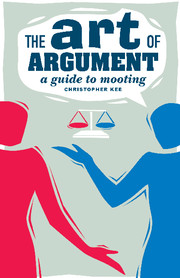Book contents
- Frontmatter
- Contents
- Preface
- Acknowledgments
- Part 1 Making the most of a moot
- 1 Introduction
- 2 You've made the team – what next?
- 3 Being part of a team
- 4 Building an argument
- 5 Written documents
- 6 Oral submissions
- 7 Practice moots
- 8 The competition itself
- 9 After it's all over
- Part 2 References and resources
- Part 3 International moots
- Index
6 - Oral submissions
Published online by Cambridge University Press: 05 June 2012
- Frontmatter
- Contents
- Preface
- Acknowledgments
- Part 1 Making the most of a moot
- 1 Introduction
- 2 You've made the team – what next?
- 3 Being part of a team
- 4 Building an argument
- 5 Written documents
- 6 Oral submissions
- 7 Practice moots
- 8 The competition itself
- 9 After it's all over
- Part 2 References and resources
- Part 3 International moots
- Index
Summary
While only some moots have a document competition, all moots have oral hearings. The style and rules of the competitions vary greatly. For example, in most moots you stand to make your submissions, but in an arbitration moot you usually make your presentation sitting down. It is very important that you have researched the rules governing how your moot is to be conducted. You need to feel comfortable in the moot environment. The less stressed you feel the better your performance will be. Familiarising yourself with the process, thereby reducing the possibility of surprises, is an important step in reducing stress.
As you read this section on producing oral submissions, consider how many of the techniques discussed can be traced back to one fundamental task – thinking about thinking. How often do you think about how you actually think through a problem and understand concepts and arguments? For example, do you think in pictures or in words? Some people find understanding a concept much easier if they can see the concept represented as a diagram. Others tend to think in words. Everyone is unique, although the differences may only be a matter of degree.
When you present an argument, you need to recognise that your audience may have different ways of understanding the presentation of your argument. No one in your audience will think in exactly the same way as you. As a consequence, your carefully constructed plan that makes perfect sense to you may not make sense to someone else.
- Type
- Chapter
- Information
- The Art of ArgumentA Guide to Mooting, pp. 52 - 93Publisher: Cambridge University PressPrint publication year: 2007



